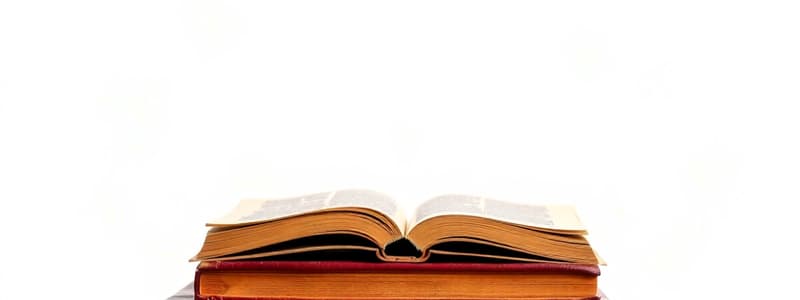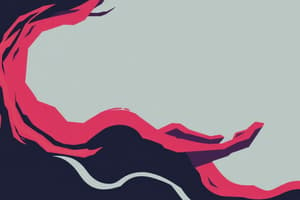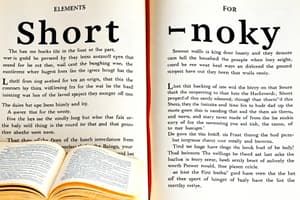Podcast
Questions and Answers
What is the primary purpose of the setting in a short story?
What is the primary purpose of the setting in a short story?
- To outline the sequence of events
- To convey the main idea of the narrative
- To introduce the main character
- To establish the time and place of the story (correct)
Which component of a plot demonstrates the highest point of tension or drama?
Which component of a plot demonstrates the highest point of tension or drama?
- Resolution
- Climax (correct)
- Exposition
- Falling Action
What does the term 'conflict' refer to in a short story?
What does the term 'conflict' refer to in a short story?
- The sequence of events that unfold
- A struggle between opposing forces (correct)
- The main character's backstory
- The introductory part of a narrative
Which point of view allows the reader to feel like they are directly addressed in the narrative?
Which point of view allows the reader to feel like they are directly addressed in the narrative?
How is the tone of a story best described?
How is the tone of a story best described?
Which of the following best captures the meaning of 'theme' in a literary work?
Which of the following best captures the meaning of 'theme' in a literary work?
Flashcards
Setting
Setting
The time and place where a story takes place.
Plot
Plot
The sequence of events in a story, including Exposition, Rising Action, Climax, Falling Action, and Resolution.
Conflict
Conflict
A struggle between opposing forces in a story.
Point of View
Point of View
Signup and view all the flashcards
Theme
Theme
Signup and view all the flashcards
Tone
Tone
Signup and view all the flashcards
Study Notes
Short Story Elements
-
Setting: The time and place where the story occurs. Examples include a specific day in a classroom or an afternoon in a school garden.
-
Characters: The people or beings involved in the story.
-
Plot: The sequence of events in the story. Key parts include exposition, rising action, climax, falling action, and resolution.
-
Conflict: A struggle between opposing forces. Examples include man vs. man or man vs. society.
-
Point of View: The perspective from which the story is told. Examples include first person, second person, and third person.
-
Theme: The central message or idea of the story. Examples include "honesty is the best policy" or "believe in yourself".
-
Tone: The author's attitude toward the subject matter, reflected in their writing style. Examples include inspirational or humorous.
-
Mood: The feeling or atmosphere created for the reader. Examples include calm or peaceful.
Studying That Suits You
Use AI to generate personalized quizzes and flashcards to suit your learning preferences.




